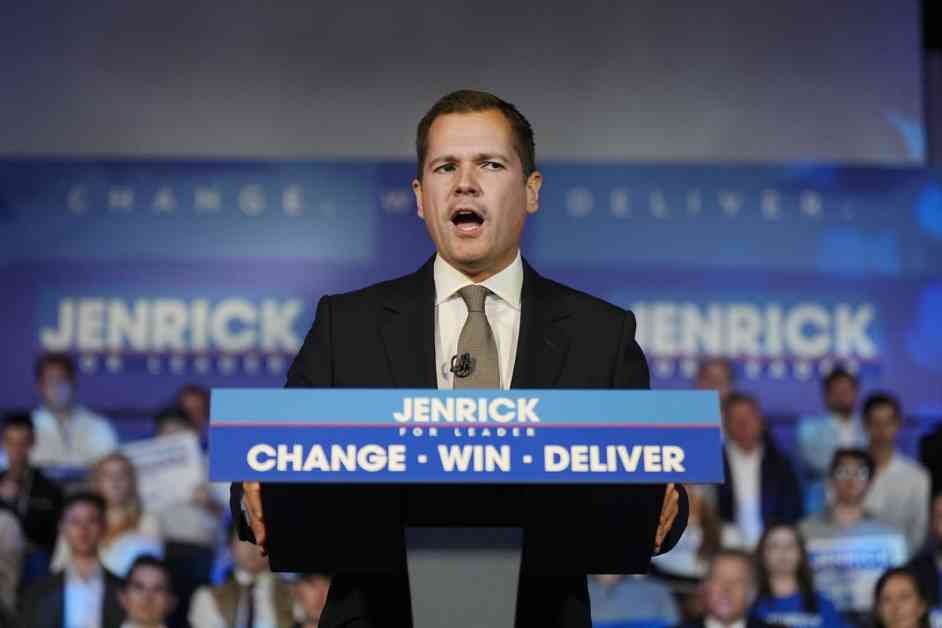Robert Jenrick, a prominent figure in the Conservative Party, has stirred controversy with his firm stance on leaving the European Convention of Human Rights (ECHR). In a bold move to appeal to right-wing voters and address concerns over immigration, Jenrick has positioned himself as a leading candidate for the party’s leadership. Despite facing criticism from his rivals, Jenrick remains resolute in his belief that withdrawing from the ECHR is necessary for the future of the United Kingdom.
The Debate Over Leaving the ECHR
Jenrick’s proposal to leave the ECHR has sparked a heated debate within the Conservative Party. Supporters argue that this move is essential to regain control over immigration policies and uphold national sovereignty. They believe that the ECHR’s regulations limit the UK’s ability to enforce strict immigration laws and protect its borders effectively. By withdrawing from the convention, they argue, the UK can assert its independence and make decisions that align more closely with the interests of its citizens.
Opponents, on the other hand, contend that leaving the ECHR would have far-reaching consequences for human rights and international relations. They warn that such a decision could isolate the UK from its European allies and weaken its commitment to upholding fundamental freedoms. Critics argue that the ECHR serves as a vital safeguard against abuses of power and provides a framework for protecting individuals’ rights across Europe. They caution that withdrawing from the convention could undermine the UK’s reputation as a champion of human rights and erode its standing on the global stage.
Jenrick’s Justification for Leaving the ECHR
In defending his position, Jenrick has emphasized the need for decisive action on immigration and national security. He argues that the current system is not working effectively and that bold measures are required to address the escalating crisis. Jenrick points to the surge in illegal migration and the challenges faced in controlling the English Channel as evidence of the urgent need for change.
Jenrick’s experiences traveling across Europe have reinforced his belief that leaving the ECHR is the right course of action for the UK. He highlights the lack of consensus among European countries on reforming the convention and the significant time and effort required to achieve any meaningful changes. Jenrick asserts that the public is demanding action on immigration and that failure to deliver results could have dire consequences for the Conservative Party’s electoral prospects.
Criticism and Alternative Perspectives
Despite Jenrick’s steadfast commitment to his proposal, he has faced criticism from within his own party. Rivals such as James Cleverly and Kemi Badenoch have raised objections to Jenrick’s plan, citing concerns about the implications of leaving the ECHR. Cleverly, who oversaw the Rwanda deportation legislation, argues that the UK Supreme Court, not the ECHR, was responsible for blocking flights to the country. He emphasizes the importance of focusing on practical solutions and delivering tangible results rather than pursuing ideological agendas.
Badenoch, another contender for the party leadership, has characterized Jenrick’s approach as seeking “easy answers” to complex issues. She advocates for a more nuanced and pragmatic approach to immigration and human rights, one that balances national security concerns with respect for international obligations. Badenoch warns against rash decisions that could jeopardize the UK’s standing in the global community and undermine its commitment to upholding fundamental freedoms.
In response to his critics, Jenrick remains resolute in his conviction that leaving the ECHR is necessary to address the pressing challenges facing the UK. He argues that the current system is unsustainable and that bold action is required to restore public confidence in the government’s ability to manage immigration effectively. Jenrick acknowledges the risks and uncertainties associated with withdrawing from the convention but believes that the potential benefits outweigh the costs.
The Future of the ECHR Debate
As the debate over leaving the ECHR continues to unfold, the Conservative Party faces a critical decision about its future direction on human rights and immigration. The outcome of this debate could have far-reaching implications for the UK’s relationship with Europe, its standing in the international community, and its commitment to upholding fundamental freedoms. Whether Jenrick’s proposal gains traction or faces resistance remains to be seen, but one thing is clear: the stakes are high, and the consequences of this decision could shape the UK’s trajectory for years to come.












